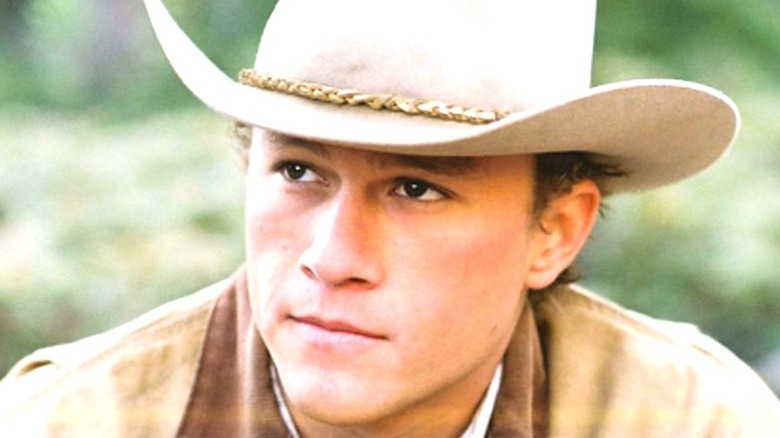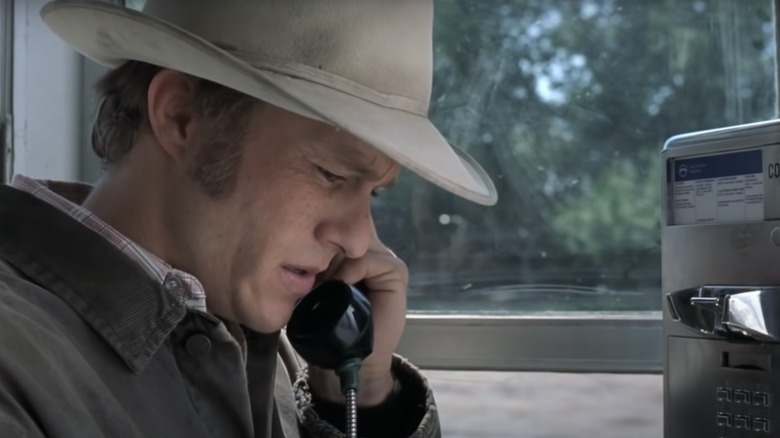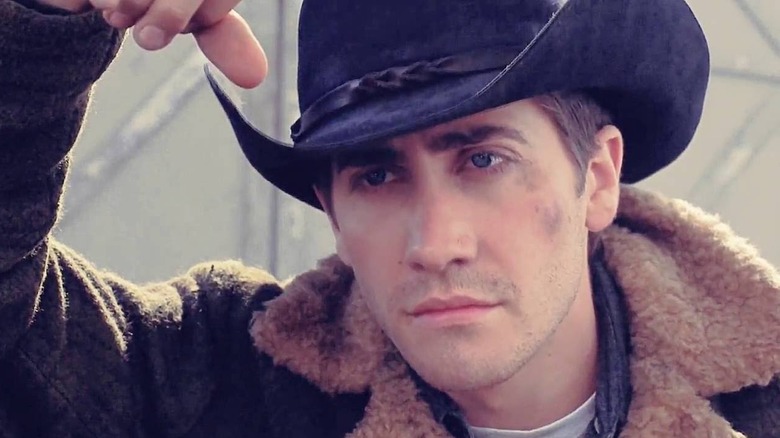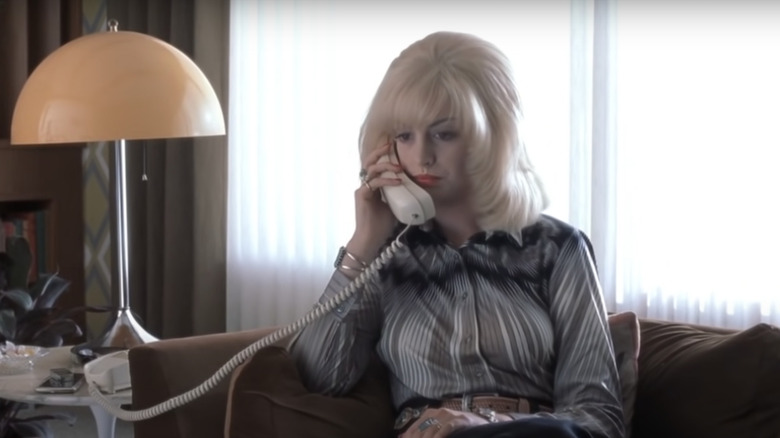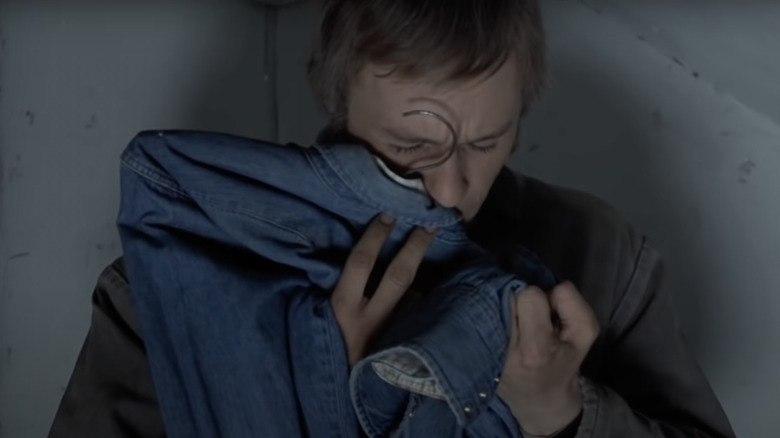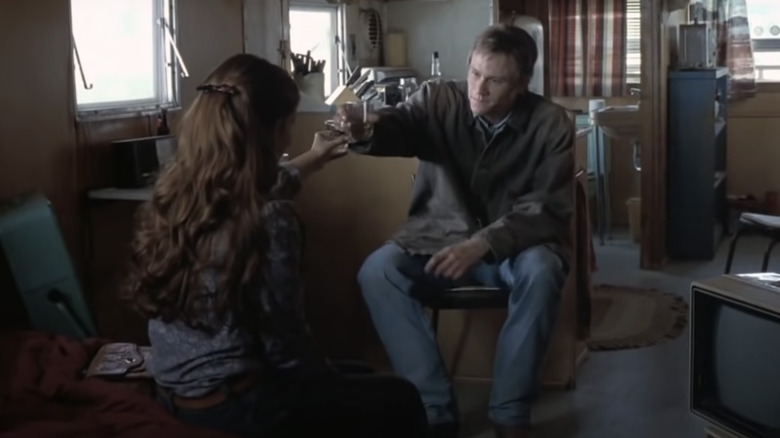The Ending Of Brokeback Mountain Explained
The tragic love story of Ennis Del Mar (Heath Ledger) and Jack Twist (Jake Gyllenhaal) in "Brokeback Mountain" has been captivating viewers — gay and straight alike — since the film came out in 2005. "Brokeback Mountain" consistently ranks among the actors' best movies (even though Ledger almost didn't star in it) for its heart-wrenching screenplay by Larry McMurtry and Diana Ossana, thoughtful direction by Ang Lee, and strong performances by the supporting cast, including Michelle Williams as Alma Beers Del Mar and Anne Hathaway as Lureen Newsome Twist.
While "Brokeback Mountain" would meet critical acclaim — even earning Lee the 2006 Academy Award for Best Director — the content was, of course, not everybody's cup of tea. The film would also receive backlash from countless American conservative pundits, and its global reception was also hit-or-miss, with countries around the world restricting showings or DVD distribution, censoring the more intimate scenes, or even banning it outright.
Celebrations and condemnations aside, "Brokeback Mountain" is so memorable because of the uncertainty of its ending, where Jack's death is uncontested but its cause remains up to interpretation.
No more trips to Brokeback Mountain
After Ennis is returned a postcard he sent to Jack with the word "DECEASED" stamped on it, he calls Lureen to learn more about the circumstances surrounding his lover's death. It's a tough scene to watch, as Jack's two partners discuss the loss of their beloved with extreme tension, as it is uncertain how much Lureen knows about the cowboys' relationship. Lureen tells Ennis that she would have let him know about Jack's death, but she didn't know his name or address because "Jack kept his friends' addresses in his head" — thereby seeming to imply that Ennis was not his only "fishing buddy." And this is true, to some extent: As Jack and Ennis' rendezvouses became increasingly infrequent, Jack began taking trips down to Mexico, where he would pick up hustlers, and it is also possible he had a relationship with his and Lureen's mutual friend Randall Malone (David Harbour).
But Lureen quickly turns to the matter at hand and recounts the events that led to Jack's death: "Jack was pumping up a flat on the truck out on the back road when the tire blew up. The rim of the tire slammed into his face, broke his nose and jaw, and knocked him unconscious on his back. By the time somebody had come along, he'd drowned in his own blood. He was only 39 years old." Her account is so robotic that it's suspicious. Has she just told this painful story so many times that she's grown numb to it, or is it actually fiction, designed to cover up the embarrassing circumstances of Jack's death — connected to his homosexuality, maybe? This ambiguity is furthered by the visuals that accompany Lureen's play-by-play.
One phone call, two deaths
As Lureen tells her story, the camera cuts from her close-up to one of Ennis, then to a long shot of a grassy field next to some railroad tracks, where three men are beating Jack to death — the kicks to Jack's groin reinforce the idea that this is a hate crime. It is conventional in film editing to cut from a close-up of an actor's face to another scene to indicate that the following scene is from that character's imagination, but this is not always the case, and viewers are left to decide whether the murder is all in Ennis' head or if they are being presented with the truth behind Jack's death.
Anne Hathaway commented on this scene in a 2010 interview with NPR's "Fresh Air," saying that they shot the phone call in two ways: One in which Lureen knows of the men's relationship and is lying about Jack's death, and another in which she was only reporting what she knew to be true, that a tire exploded, killing her husband. The two takes were ultimately merged in the final cut of "Brokeback Mountain," making things much less clear.
Lureen knew something was up, but didn't know the extent of it until the end
One part of the phone call scene that seems to come from the more unaware take is when Ennis and Lureen discuss Jack's cremation and his wishes for his remains. Lureen tells Ennis that although there is a tombstone with the name "Jack Twist" on it, he was cremated and his ashes were divided between her and his parents. She pauses, smacks her lips, then says, "He used to say he wanted his ashes scattered on Brokeback Mountain, but I wasn't sure where that was," before guessing it might be near where he grew up.
When Ennis tells Lureen that Brokeback Mountain was where they herded sheep one summer, he confirms what she has already suspected. Tears well in her eyes as she finally understands that her husband's "favorite place" was where he began his long-term affair with Ennis. The two soon end the call, and Ennis plans to visit Jack's parents to see about the ashes.
A hidden compartment and two bloody shirts
At Jack's parents' house, Jack's father denies Ennis the ashes, but the distraught cowboy is permitted to go up to his former lover's childhood room. There, Ennis wanders around glumly, inspects a cowboy toy with tears in his eyes, and sits by the window to collect himself. He eventually goes to Jack's closet, where, after gently brushing some of his flannels and picking up an old boot, he discovers a secret area where Jack has hidden their bloody shirts from their big brawl on Brokeback Mountain. Ennis' shirt is inside Jack's, a sentimental nod to their connection.
Ennis breaks down as he caresses the shirts, and Jack's mother allows him to take them instead of the ashes. He may not be able to carry out Jack's wishes for his remains, but he will get to hold onto a memento from a defining moment for the beginning of their relationship.
Ennis chooses love in the end
The final scenes of "Brokeback Mountain" take place at Ennis' trailer, where his 19-year-old daughter Alma Jr. (Kate Mara) surprises him with the news that she is engaged to be married. To her disappointment, Ennis initially tells her that he won't be able to come to the wedding because of a ranch hand job he has planned for that time, but after some reflection, he decides to prioritize his daughter and call off the job, and he pours them some celebratory drinks.
After Alma leaves, Ennis walks over to his closet to visit his and Jack's shirts, which are now inverted, with Jack's shirt inside his and hung next to a photograph of Brokeback Mountain. Tears again come to his eyes, and he utters the iconic line, "Jack, I swear," before the credits roll. Learning from his past mistakes, Ennis decides to be there for his loved ones and to go to Alma's wedding instead.
"Brokeback Mountain" is not just about two men fighting to make sense of a love that they have been taught to reject — it also follows their journeys to overcome the inadequacy they feel from their failure to live up to the expectations of rigid masculinity that they face as cowboys in mid-century rural America. Ennis may not have been able to accept his love for Jack until it was too late, but he can decide to embrace love going forward and be more present in the lives of his daughters.
